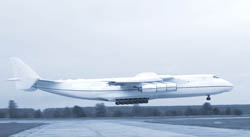EU-Ukraine synergies boost aviation industry
Despite boasting a very strong aeronautics sector, Ukraine has not participated adequately in EU projects. The EU-funded 'Stimulating Ukraine-EU aeronautics research cooperation' (AERO-UKRAINE) project aimed to change this by building new partnerships between both regions. To achieve its aims, the project mapped existing aeronautics collaboration potential between the EU and Ukraine, highlighting opportunities and disseminating the results to relevant stakeholders. It organised aeronautics events in Ukraine which attracted more than 200 registered participants from various Ukrainian aeronautic R&T organisations and many representatives of similar organisations from European Union. These events featured training and networking with EU aeronautics actors, boosting participation in EU projects under its Seventh Framework Programme (FP7). These events enabled the Ukrainian aeronautic R&T organisations to unveil exciting project ideas and capabilities to European stakeholders, setting the stage for powerful new partnerships. In parallel, the project helped establish EU aeronautics National Contact Point (NCP) in Ukraine, organising as well a series of events and workshops that attracted stakeholders from both regions. It also identified more than 50 leading Ukrainian aviation companies in aeronautical research, producing a brochure to disseminate this valuable information. Already, the initiative has given rise to a number of projects being submitted under FP7 by Ukrainian institutes. One key project, which was approved for funding, envisioned a 'Composite aircraft active lightning strike protection system'. Other successful project proposals were related to topics such as efficient systems and propulsion for small aircraft and fuselage design for increasing safety. The AERO-UKRAINE project helped encourage policymaking to foster synergies in the aeronautics sector beyond Europe's borders. It led to a comprehensive agreement to establish a common aviation area, giving rise to new market opportunities. This helped ensure regulatory convergence in fields such as aviation safety, aviation security, environmental protection and industrial cooperation. Importantly, three project workshops that involved key industry players from both regions took place in Ukraine. The first was hosted by the Institute for Problems in Materials Science (IPMS) in Kiev and the second was hosted by the country's aeronautics giant, Ivchenko-Progress. The third event was organised by Ukraine's National Aerospace University (the Kharkiv Aviation Institute (KhAI)), cementing the project's ties with academia as well. All of them were supported both by AIRBUS and Antonov Company. There were several other key achievements that supported the project's mission, including a brokerage event to match project partners, a small businesses-focused workshop, and intensive dissemination activities. Thanks to these efforts, Ukraine's crucial and beneficial role as an integral player in the European aeronautics sector has now been guaranteed. Such new synergies will undoubtedly bring major advances to the aviation sector and related industries in both the EU and Ukraine.



